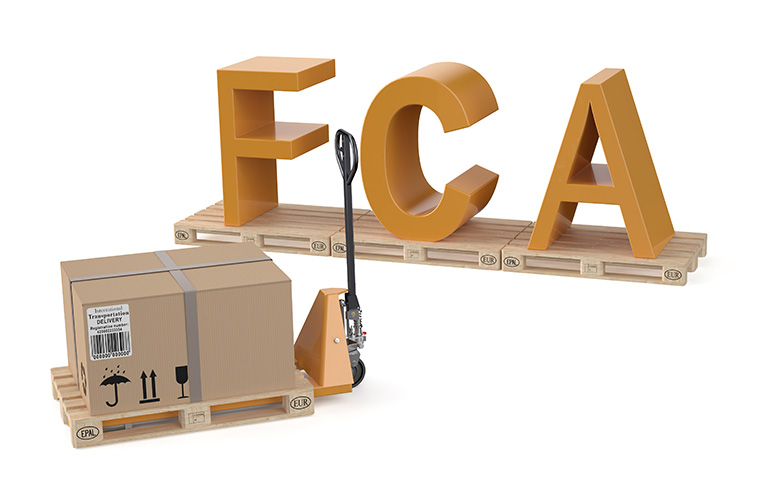Have you started a professional activity that requires the transport of goods? In that case, you may be new to you two words that have an important meaning in logistics: FCA Incoterm. The latter is very often misspelled and mispronounced. Thus, on the internet there is a lot of literature referring to “FCA icoterm”. But why is it so important in logistics processes? We explain it to you!
What is FCA Incoterm in logistics?
First of all, let us remember that Incoterms are terms used in international contracts that provide detailed information on the obligations of each of the parties at the time of delivery of goods. Naturally, we are talking about the exporter or seller, on the one hand, and the importer or buyer, on the other.
Incoterm is a very descriptive abbreviation for International Commercial Terms. And, when it is preceded by the acronym FCAit is an Incoterm specific. FCA stands for Free Carrier, one of the Incoterms 2020.
In the case of FCA, the seller fulfills his obligations when he delivers the goods to the carrier chosen by the buyer at an agreed place, which may be a port, an airport, a transport terminal or any other place.
Next, we will delve into the obligations and responsibilities of the buyer and seller when the FCA Incoterm is applied. Let’s see!
FCA Incoterm: Obligations and Responsibilities for the Seller
In general, the seller has fewer liabilities under the FCA Incoterm.. The person who exports you don’t have to worry about international transportation, which can simplify your logistics process and reduce your costs. These are the seller’s main obligations:
Packaging and packing
The seller must prepare the goods for international transport in an adequate manner, ensuring their protection against damage during the journey. This includes the use of appropriate packaging materials, correct marking and labeling with information on the contents, handling instructions and final destination, and compliance with the specific packaging regulations of the destination country.
Customs clearance for export
The seller is responsible for completing all customs formalities necessary to remove the goods from their country of origin. This includes the presentation of the required documents, such as the commercial invoice, certificate of origin and packing list, and the payment of any applicable export duties and taxes.
Loading of goods
The seller must load the goods on the means of transport chosen by the buyer, whether it is a truck, sea container, airplane or any other means. This involves coordinating with the transportation company and supervising the loading process to ensure that it is carried out safely and efficiently.
Provide documents to the buyer
The seller must provide the buyer with all necessary documents for international transportation and customs clearance in the destination country. These documents may include the commercial invoice, bill of lading, packing list, certificate of origin and any other documents required by local authorities.
Notification to the buyer
The seller must notify the buyer once the goods have been delivered to the carrier. This notification should include information on the date and time of delivery, the bill of lading number and any other information relevant to the tracking of the shipment.
Compliance with the terms of the contract
The seller must comply with all the conditions agreed in the sales contract, including the quality, quantity and specifications of the goods, as well as the date and place of delivery.
FCA Incoterm: Obligations and Responsibilities for the Buyer
The buyer has full control over transportation from the agreed delivery point, allowing him to choose the carrier, route and shipping method that best suits his needs. However, the buyer must be aware that he assumes more risks and responsibilities than with other Incoterms, such as FOB or CIF. In addition, the FCA Incoterm may involve greater administrative complexity for the buyer, who must take care of all the formalities related to international transport, which may require experience in foreign trade. If you are the buyer, take note of your obligations!
Contracting and payment of international transportation
The buyer is responsible for selecting and contracting the transport company that will be in charge of moving the goods from the agreed delivery point in the country of origin to the final destination in the country of destination. This includes negotiating freight rates, reserving transportation space and coordinating shipping dates.
Transportation insurance
The buyer must take out adequate transport insurance to cover the goods against loss, damage or theft during the journey. Insurance coverage must be sufficient to cover the full value of the goods and additional costs in the event of an incident.
Customs clearance in the destination country
The buyer is responsible for completing all customs formalities necessary to enter the goods into the country of destination. This includes submission of the required documents, such as the commercial invoice, bill of lading and packing list, and payment of any applicable import duties and taxes.
Receipt of goods
The buyer must arrange for receipt of the goods at the final destination and coordinate with the carrier for unloading and delivery of the goods. This involves checking the condition of the goods and filing any claims in case of damage or missing items.
Assuming risks and costs
From the moment the goods are delivered to the carrier at the agreed delivery point, the buyer assumes all risks and costs associated with international transportation. This includes liability for loss, damage, theft, delay and any other incident that may occur during the trip.
Compliance with the terms of the contract
The buyer must comply with all conditions agreed in the sales contract, including payment of the price of the goods, transportation costs and any other agreed additional costs.
When is it of interest to apply the FCA Incoterm?
In general, the FCA is an Incoterm suitable for buyers who:
- They want to have full control over the transport of the goods.
- They have experience in foreign trade and the ability to manage the procedures related to international transportation.
- They are willing to assume the risks and costs of international transportation.
If you are considering using the FCA Incoterm in your next international sale and purchase transaction, it is important to make sure that you have a good understanding of each party’s responsibilities and that you carefully negotiate the terms of the sales and purchase agreement.
Do you still doubt that the FCA is the Incoterm more convenient for your transaction? Consult now with Partida Logística!




